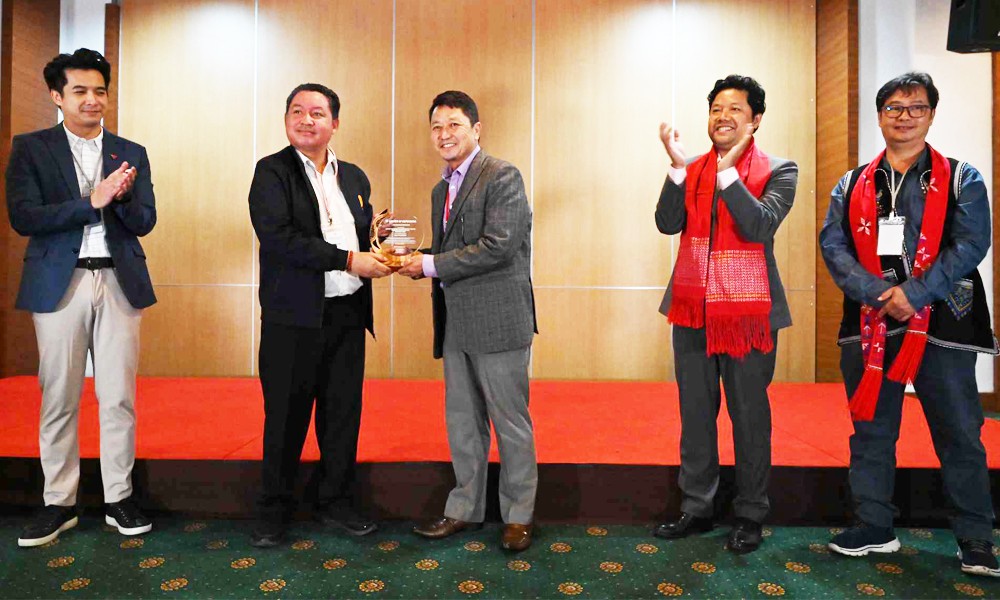After a years’ long investigation, the Complaint Mechanism of European Investment Bank (EIB), a European Union watchdog unveils a landmark ‘Investigation Report’ today recommending EIB to take urgent steps to uphold Indigenous Peoples’ right to Free, Prior, and Informed Consent (FPIC) in its funding in 220 KV Marsyangdi Corridor Transmission Line in Lamjung district.
“The report is the culmination of years long EIB Complaints Mechanism investigation to determine compliance of the project with the EIB’s environmental and social standards,” reads a Press Release issued jointly by FPIC & Rights Forum, Lawyers Association for Human Rights of Nepalese Indigenous Peoples (LAHURNIP) and Accountability Counsel. The report was prompted by a complaint filed by the FPIC & Rights Forum in October 2018. In 2019, the Nepal Electricty Authority (NEA) refused a mediation process requested by the communities.
The 220 KV Marsyangdi Corridor Transmission Line built with investment from EIB in Lamjung district passes through the Annapurna Conservation Area and will have significant impacts on Indigenous communities’ land use and management patterns, forests, and biodiversity.
The findings govern the EIB’s nearly 100 million euro Nepal Power System Expansion Project, in particular its 220 KV Marsyangdi Corridor transmission line component. The project-affected area is home to groups of Indigenous peoples that include the Gurung, Tamang, Ghale, Magar, Bhujel, Newar and Chepang. The line passes through the Annapurna Conservation Area and will have significant impacts on Indigenous communities’ land use and management patterns, forests, and biodiversity. The project is being implemented by the Nepal Electricity Authority (NEA), a wholly state-owned company.
“This investigation vindicates concerns communities have been raising for years about the Marsyangdi Corridor transmission line and being left in the dark about its design, route, impacts and mitigation measures,” said Chandra Misra, Secretary of the FPIC & Rights Forum, a committee representing communities in Western Nepal advocating for a rights-based approach to hydropower development in their region.
“The EIB and NEA must immediately halt the project unless and until Indigenous Peoples give their consent,” said Khem Jung Gurung, Chairperson of the FPIC & Rights Forum. “Communities recently published an FPIC protocol which provides concrete guidance on designing an FPIC process.”
The report found that the EIB overlooked the project’s impact on Indigenous Peoples, including that a mandatory FPIC process was not conducted. FPIC is an international legal standard empowering Indigenous Peoples to give or withhold consent to projects affecting them and their territories. The EIB Complaints Mechanism has recommended that "major lenders and development partners in the energy sector coordinate efforts and -with the help of experts- work closely... to develop a tailor-made approach for meeting FPIC requirements in energy projects in Nepal."
For decades, Indigenous Peoples in Nepal have faced discrimination and opposition in the face of their fundamental rights and calls for self-determination, including in development projects.
“For decades, Indigenous Peoples in Nepal have faced discrimination and opposition in the face of their fundamental rights and calls for self-determination, including in development projects,” said Shankar Limbu from the LAHURNIP, which is supporting the communities. “We are hopeful this landmark investigation will support the movement to implement ILO Convention 169 in Nepal and improve compensation practices.” ILO Convention no. 169, to which Nepal is a party, is a landmark international agreement protecting the rights of Indigenous Peoples and requiring governments to engage in meaningful consultation with them.
This investigation presents a strong condemnation of the EIB and NEA’s failures to abide by EIB rules and international legal commitments. The Complaints Mechanism expressed “serious concern” that the Bank provided funding even though the NEA had not fulfilled conditions for EIB financing related to resettlement. Communities have been provided little information about resettlement impacts and compensation, including both landowners who will be physically displaced by tower construction and those who will be economically displaced under the line’s right of way. Some community members have also reported intimidation by project authorities to accept compensation.
Transmission line projects in Nepal are often marred by grievances due to insufficient compensation for land use restrictions under the right of way. According to EIB standards, compensation needs to be fair, adequate and at full (100 percent) replacement cost, but Nepalese policy is to only compensate for 10 percent of the total land value. This leaves communities without compensation sufficient to replace devaluation of their land and lost earning capacity that secures their livelihoods and community fabric. The Complaints Mechanism has recommended a more flexible and transparent approach based on best practices whereby the actual impacts of land use restrictions under the right of way are assessed on a case-by-case basis.
The EIB has large investments in Nepal’s hydropower sector but has done little to stop Indigenous rights violations, particularly their right to FPIC.
The investigation also found major flaws in public consultation processes, with low participation levels particularly of women. In one project area, the total number of people who attended public consultations was as low as one percent of the total population. Moving forward, the Complaints Mechanism recommends that the EIB must only provide further financing for the Marsyangdi Corridor if the project company meets certain social and environmental benchmarks.
“The EIB has large investments in Nepal’s hydropower sector but has done little to stop Indigenous rights violations, particularly of FPIC,” said Anirudha Nagar, Communities Director at Accountability Counsel, which is supporting communities throughout the complaint process. “As the momentum for corporate accountability and human rights due diligence builds in Europe, including with Germany’s recent ratification of ILO 169, all eyes are on how the EIB will respond to this investigation to ensure its commitments have meaning.”








